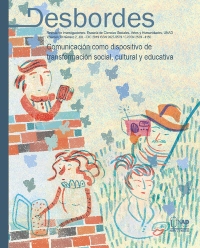Copyright (c) 2020 Desbordes

This work is licensed under a Creative Commons Attribution-NonCommercial-ShareAlike 4.0 International License.
La revista Desbordes se reserva el derecho de reproducción total o parcial del material en medio físico o digital, así como su inclusión en bases de datos, hemerotecas y demás procesos de indexación (SIRes).
La aceptación o rechazo de artículos postulados dependerá del concepto final emitido por los pares evaluadores y el aval de los comités editorial y científico.
Las ideas y conceptos expresados son responsabilidad de los autores y, en ningún caso reflejan las políticas de la UNAD
Cartoon as a Political Criticism in the Framework of the Peace Dialogues
Political cartoon as an artistic and opinion expression is accompanied by a series of daily social, political and imaginary antecedents that enhance the construction and understanding of social reality. Thus, it is important to understand the way in which this means of communication potentiates the understanding of a fact, situation or historical moment. The satire, the mockery and the graphic line that each artist gives contributes to a specific understanding of the world. The point of view, in this case that of Julio César González (Matador), in the cartoons has represented a singular format that points directly to the country's politics. During the years in which his cartoons have been published in the newspaper El Tiempo, they have shown not only their critical attitude towards corruption, injustice and politics, but also they have become a reference for those who want to "understand" the scope of a media topic. In this way, the complete analysis of his work, which includes politicians, issues and complaints, makes it possible to recognize a lack of political culture in the country, and this is the reason why people are deceived by wrong ideas and messages in the face of social and political reality, as happened on October 2, 2016 in the plebiscite.
This work then seeks to analyze the historical facts that are represented by the cartoons published in the newspaper El Tiempo and more specifically those found in the illustrated book Matando el tiempo by the publisher Intermedio, launched in 2016. From this book, 40 cartoons will be extracted. These cartoons highlight the political role of important well-known persons or moments that had transcendental significance in political life and marked the situation for Matador to shape public opinion. In this way, it is intended to understand the social reality of the country, by analyzing theories that allow an approach to how people and/or the cartoonist himself feel regarding the country in a given moment and how these artistic expressions in turn affect the perception about politics in the citizens.




